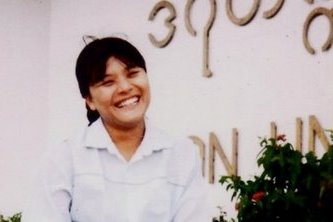Political prisoner Ma Noble Aye was reportedly killed in detention by junta troops in Bago Region’s Waw Township early this month. In her honor, The Irrawaddy revisits a 2008 story about her and another political prisoner family.
This is the true story of two lovers who decided to put their country’s affairs ahead of their love affair. As a result, they find themselves in jail and in exile.
But they are still deeply in love, along with many other men and women in the activist movement who fall in love, only to be tragically separated and sent off to jail or exile in these troubled times in Burma.
But, amazingly, love still endures and runs deep in their lives.
On August 22, 2007, the first anniversary of their relationship as girlfriend-boyfriend, Tin Aye, a political activist, asked his girlfriend, Noble Aye, also an activist:
“Do you really love me?”
“Yes,” she said, with a bashful smile.
At the time, the 44-year-old activist had no idea those sweet words would be among the last they would share together—at least for now.
The next day, Noble Aye’s home was ransacked by military authorities, and she was hauled off to detention.
Tin Aye stayed in Rangoon for a few months and then decided that it was too dangerous to continue his political activities inside the country and fled to neighboring Thailand.
Tin Aye and his girlfriend, Noble Aye, 33, also known as Hnin May Aung, both share a deep commitment to democracy for the military-ruled country, perhaps, if possible, even deeper than their love for each other.
Noble Aye was first arrested in 1998 and detained in various prisons until 2005. Her mother was arrested the same year for her own political activities as a member of the main opposition party, the National League for Democracy.

Tin Aye was arrested in 1989 and sentenced to 20 years imprisonment. His imprisonment led to his first girlfriend leaving him during his first year in Insein Prison.
“Our lives are like this,” said Tin Aye. He served nearly 16 years of his sentence.
Noble Aye and Tin Aye were both released in 2005, one year before they met for the first time in an office of a monthly magazine in Rangoon where they worked together as editorial staffers. Noble Aye was studying physics at Dagon University.
They soon found that their political beliefs and their common experiences in the movement and in prison, made them close. It was probably inevitable that they fell deeply in love, a love entwined with respect and admiration.
The only thing that could separate them was the junta. They each continued in their political opposition to the military regime.
Tin Aye recalled, “I told her once that I didn’t want to disturb her politics because of my love. I told her, ‘For me, you would be second when it comes to my country’s affairs.’”
And then it came, the knock on the door, the arrest, her detention in Insein Prison. The lovers’ separation—for how long no one knows. She has yet to be sentenced.
Tin Aye says simply that he is proud of Noble Aye, and her sacrifice to try to bring democracy to the country. She is a member of the influential 88 Generation Students Group, led by prominent former student leader Min Ko Naing, who is also in Insein Prison. Members of the student group marched against the military government’s hike in fuel prices in August 2007, activities that led to the monk-led demonstrations in September.
Many members of the student group were jailed in August and many others have been in hiding since then, continuing their clandestine political activities.
In fact, the love story of Tin Aye and Noble Aye is typical among activists under the military dictatorship. Many married activists and couples have suffered romantic separations since the current regime took power in 1988.
During the past 20 years, of the thousands of political prisoners, almost all have stories of romantic separation: lovers, parents, sons, daughters, husbands and wives.
Here’s one more story of an activist father and his daughter who grew up without him, separated for years by his sentence to prison.
Ne Win, a veterinarian, was arrested in 1989 along with Tin Aye in a group of 200 activists and politicians. When he was arrested, he left behind an 8-month-old baby daughter. He spent 15 years in various prisons on a 20-year sentence before his release in 2005.
When Ne Win was again arrested in June 2008, he was accompanied by his daughter, Hnin Pwint Wai, now a student at Government Technical College in Rangoon.
Like father, like daughter: Hnin Pwint Wai, 20, had become involved in the historic student organization, All Burma Federation of Student Unions, which was secretly reformed in 2007. She served as a spokesperson during the monk-led uprising in September 2007.
Both father and daughter are now in Insein Prison.
These are just two of the heartbreaking stories of love and loss in Burma.
Love of country. Loss of country. Love for a woman or a man. Loss of the woman or the man.
Through it all, run many tears of joy and sadness.
“I don’t know when I can meet Noble again,” said Tin Aye. “But I’m certain of one thing. It doesn’t matter how long she is detained. I will wait. This is my iron rule.”

















